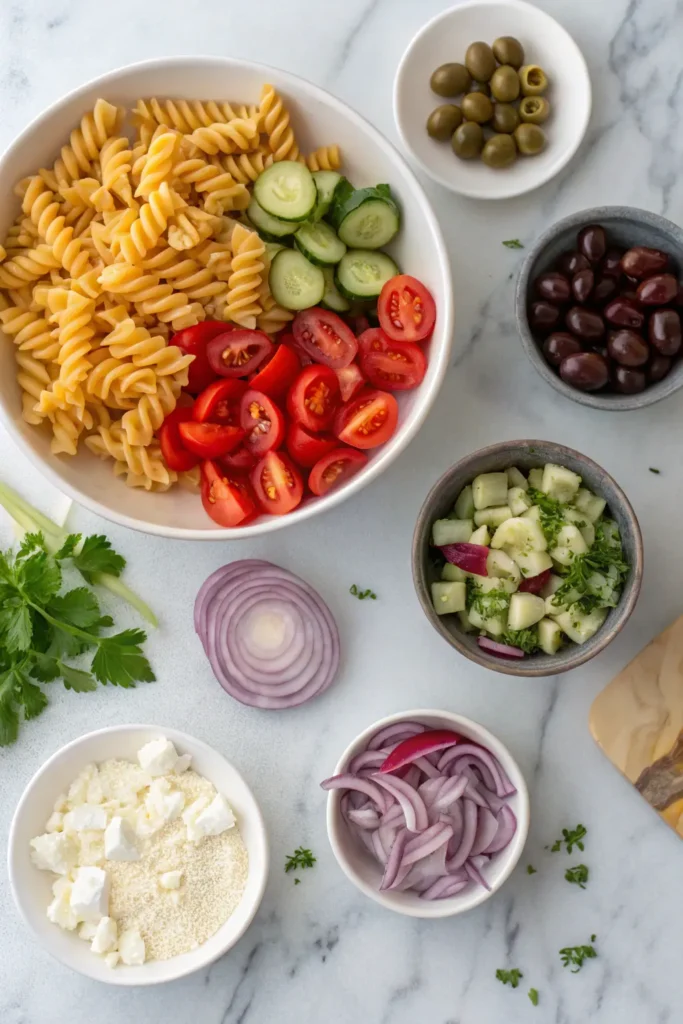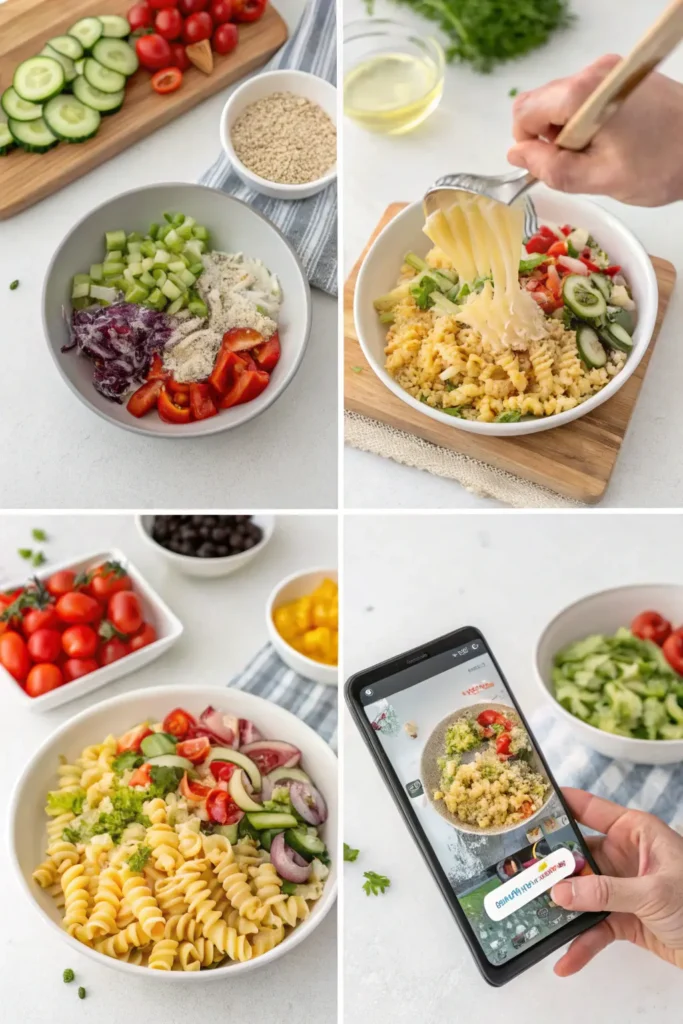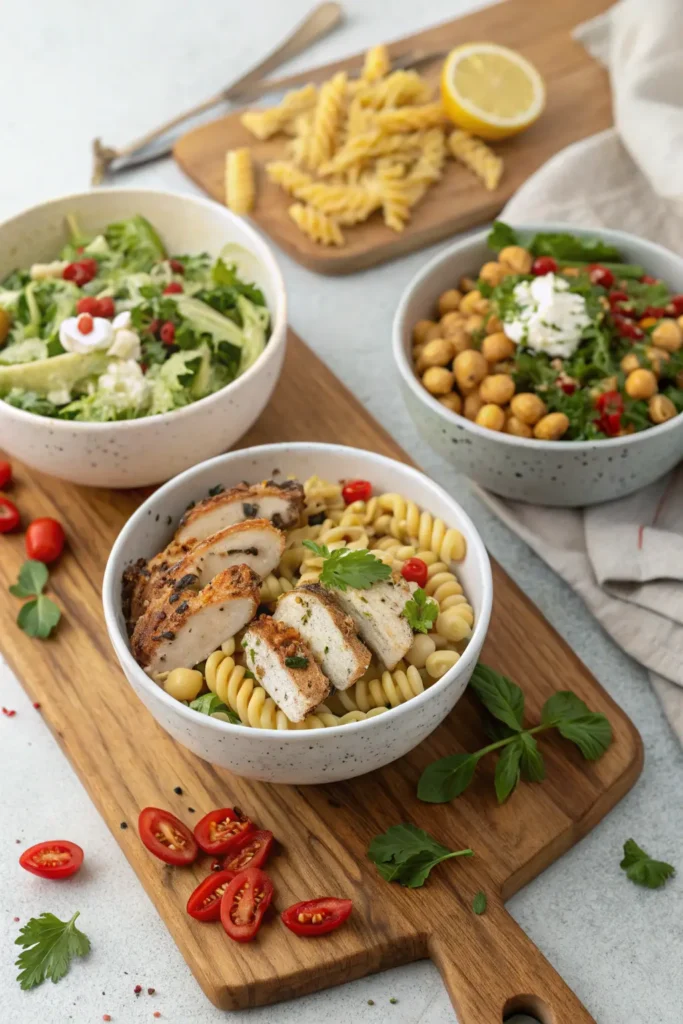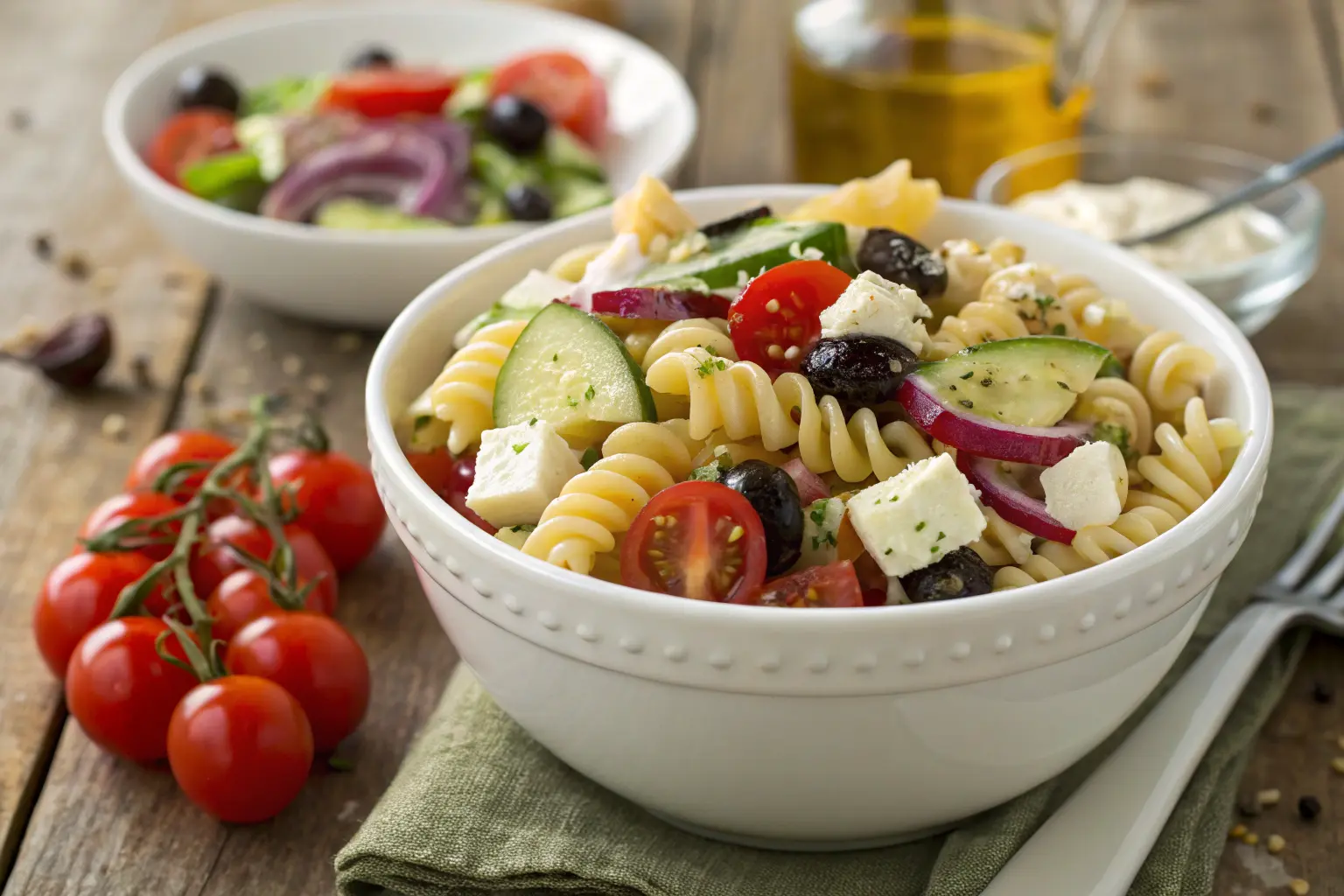Greek pasta salad is one of those dishes that effortlessly brings bold Mediterranean flavors to your plate with minimal prep. Whether you’re preparing a quick lunch, planning a picnic, or looking for a refreshing side dish for grilled meats, an Easy Greek Pasta Salad is a must-have in your rotation. In this article, we’ll cover everything from what makes this salad “Greek,” to creative variations, storage tips, and answers to all your common questions.
Looking for inspiration? Try our Chipotle Chicken Recipe that pairs perfectly with this Greek-style salad.
What Is Easy Greek Pasta Salad?
Understanding the Basics of Greek Pasta Salad
An Easy Greek Pasta Salad is a cold pasta-based dish that’s inspired by the traditional Greek salad. Instead of leafy greens, it uses pasta—typically rotini, penne, or bowtie—to carry the flavors of briny olives, tangy feta cheese, crunchy cucumbers, and juicy tomatoes. Unlike creamy pasta salads that use mayo, Greek pasta salad is tossed in a light vinaigrette made with olive oil, red wine vinegar, lemon juice, and herbs like oregano and dill.
This salad strikes the perfect balance between hearty and refreshing, making it a versatile option for nearly every occasion. The “easy” part comes from its quick prep time, limited cooking, and minimal cleanup. All you really need is one pot for boiling pasta and a bowl for tossing everything together.
What Makes It “Easy” Compared to Traditional Versions?
While some pasta salads call for hard-to-find ingredients or time-consuming steps like roasting vegetables or marinating meats, an Easy Greek Pasta Salad keeps things simple. Everything can be prepped in under 30 minutes. It’s also forgiving—meaning if you’re missing one or two ingredients, you can still create a flavorful version with what’s on hand.
Mediterranean Roots & Cultural Influence
Greek pasta salad draws its influence from the classic Horiatiki, or Greek village salad. Traditionally, Horiatiki includes tomatoes, cucumbers, olives, red onions, green peppers, feta, and oregano—without any lettuce or dressing beyond olive oil and vinegar.
How Greek Ingredients Shape This Simple Pasta Salad
The essence of Mediterranean cuisine is its reliance on fresh, whole ingredients, and Greek pasta salad is no different. Key staples—like Kalamata olives and sheep’s milk feta—carry bold, tangy flavors that are offset by cooling cucumber and sweet tomatoes. Add a lemony vinaigrette and herbs like mint or dill, and you have a dish that delivers flavor without fuss.
Why It’s a Go-To for Summer Meals and Meal Prep
Thanks to its hearty texture and bold taste, this salad can sit out at room temperature longer than dairy-based options—making it ideal for summer BBQs or potlucks. It’s also great for weekly meal prep since the flavors deepen over time. Whether as a standalone lunch or a side dish, Easy Greek Pasta Salad is one of the most flexible recipes you can have in your arsenal.
Check out our guide on prepping healthy Mediterranean meals for the week to pair with this easy salad!
Key Ingredients for Easy Greek Pasta Salad

Essential Elements for Authentic Flavor
The beauty of an Easy Greek Pasta Salad lies in its bold ingredients that require minimal effort. Each component adds texture, taste, and color to the dish, giving it the signature Greek flavor we all love.
Best Pasta Types to Use for the Salad
Not all pasta shapes work equally well in a cold salad. The ideal choices are ones that hold onto dressing and chopped veggies.
- Rotini: With its tight spirals, rotini is the most common pick—it captures the vinaigrette beautifully.
- Penne: Tubular and hearty, perfect for heavier add-ins like chickpeas or chicken.
- Farfalle (bowties): Holds shape well and adds visual appeal.
Pro Tip: Cook your pasta al dente and rinse it under cold water to stop cooking immediately. This helps prevent mushiness.
Traditional Greek Ingredients: Feta, Olives, Cucumbers
The core flavors of Greek cuisine come from a few simple ingredients, and these are what truly make this dish shine:
- Feta Cheese: Crumbled or cubed, its salty creaminess is a must.
- Kalamata Olives: Deep, briny, and distinctly Mediterranean.
- Cucumbers: Adds a refreshing crunch; English or Persian varieties are best.
- Tomatoes: Cherry or grape tomatoes add sweetness and color.
- Red Onions: Thinly sliced for a little bite—soak in water to reduce sharpness.
Optional Add-Ins and Substitutions
Protein Options: Chicken, Tofu, Chickpeas
To make this Easy Greek Pasta Salad a complete meal, try these protein-packed additions:
- Grilled chicken for a satisfying, lean option
- Marinated tofu for a plant-based version
- Chickpeas or white beans for added fiber and bulk
Ingredient Swaps for Dairy-Free, Gluten-Free Versions
Customizing your salad doesn’t mean sacrificing flavor.
- Use dairy-free feta or crumbled firm tofu for vegan versions
- Substitute gluten-free pasta like brown rice or quinoa pasta
- Add artichoke hearts or roasted red peppers for extra Mediterranean flair
How to Make Easy Greek Pasta Salad Step-by-Step

Prep Work for Ingredients
Before diving into assembly, prepping your ingredients properly ensures a better-tasting, longer-lasting salad.
Cooking the Pasta to Perfection
Start by boiling your pasta in salted water until just al dente. This step is crucial because overcooked pasta gets mushy after marinating with the dressing.
- Use a 6-quart pot with at least 4 quarts of water
- Add 1 tablespoon of salt per 4 quarts for flavor
- Cook pasta 1–2 minutes less than package directions
Once cooked, drain and immediately rinse under cold water. This not only stops the cooking but also removes excess starch, keeping your salad light and separate—not sticky.
Chopping Vegetables Evenly for Flavor Balance
Uniformly cut veggies not only look beautiful but also ensure every bite delivers a balanced burst of flavor.
- Cucumbers: Quarter lengthwise and slice into bite-sized pieces
- Cherry tomatoes: Halve them for juicier bites
- Red onions: Thin slices soak better into the dressing
- Bell peppers: Optional but colorful and crisp
Keep all pieces around the same size so they mix evenly with the pasta.
Assembling and Mixing the Salad
Now comes the fun part—combining everything into one delicious bowl of Easy Greek Pasta Salad.
Combining Ingredients for Best Texture
In a large mixing bowl, toss your cooled pasta with:
- Chopped cucumbers, tomatoes, onions
- Pitted Kalamata olives (whole or halved)
- Crumbled feta cheese
- Optional add-ins: chickpeas, chopped grilled chicken, or artichokes
Start with half of your dressing and gently toss. Let it sit for 5–10 minutes before adding more dressing, so the flavors soak in evenly without oversaturating.
Cooling & Marinating Tips for More Intense Flavor
Pasta salad gets better with time. Refrigerate the assembled salad for at least 30 minutes—or up to 12 hours—before serving.
- Cover tightly with a lid or plastic wrap
- Give it a gentle toss before serving
- Add a final drizzle of dressing or a squeeze of lemon just before eating
This makes your Easy Greek Pasta Salad tangier and more refreshing, especially for summer meals.
Storage and Make-Ahead Tips
How Long Does It Stay Fresh in the Fridge?
Stored properly, this salad will last up to 4 days in an airtight container. In fact, it often tastes better the next day!
Best Containers for Meal Prep
Choose BPA-free plastic or glass containers with tight seals. Divided containers are great for ke
eping toppings like extra feta or olives separate until serving.
The Best Dressing for Greek Pasta Salad
Classic Homemade Greek Dressing
The right dressing can make or break an Easy Greek Pasta Salad. And while there are countless bottled options out there, nothing beats the freshness of a homemade Greek vinaigrette. It’s zesty, herbaceous, and just tangy enough to complement the bold ingredients in your salad without overpowering them.
Here’s a simple recipe you can whisk together in under 2 minutes:
| Ingredient | Measurement |
|---|---|
| Extra virgin olive oil | 1/2 cup |
| Red wine vinegar | 3 tablespoons |
| Fresh lemon juice | 2 tablespoons |
| Garlic (minced) | 1–2 cloves |
| Dried oregano | 1 teaspoon |
| Dijon mustard | 1/2 teaspoon (optional) |
| Salt | 1/2 teaspoon |
| Black pepper | 1/4 teaspoon |
Ratio of Oil to Acid and How to Emulsify
A solid rule: use a 2:1 ratio of oil to acid (vinegar + lemon). To keep the dressing from separating, emulsify it by vigorously whisking, shaking it in a sealed jar, or blending it for a smoother texture. Dijon mustard or a touch of honey helps the emulsion hold, especially if you’re making it ahead.
Bottled vs. Homemade Dressing
While homemade is best, we get it—you’re busy. When opting for store-bought, look for dressings that are:
- Oil-based, not creamy
- Free of preservatives and added sugars
- Made with extra virgin olive oil and real herbs
Taste Comparison and Health Considerations
Homemade dressing not only tastes fresher but is often lower in sodium, preservatives, and artificial flavors. If you’re watching your sugar intake or sticking to clean eating, this makes a big difference.
Variations of Easy Greek Pasta Salad

Protein-Packed Versions
While a traditional Easy Greek Pasta Salad is often served as a side, you can easily turn it into a satisfying main dish by adding protein. This transforms a light dish into a hearty meal, perfect for lunches or high-energy dinners.
Adding Grilled Chicken or Shrimp
For a lean, flavorful boost, grilled proteins are a natural fit:
- Grilled Chicken: Marinate in lemon juice, garlic, and oregano, then slice and toss on top.
- Shrimp: A quick sauté with olive oil and paprika brings a smoky edge that pairs beautifully with the salad’s tangy base.
This combo delivers a Mediterranean meal that’s light, high in protein, and satisfying without being heavy.
Vegan Options With Lentils or Plant-Based Feta
Eating plant-based? No problem. You can build out a delicious vegan variation without losing any flavor:
- Chickpeas or Lentils: Add texture, protein, and fiber.
- Tofu or Tempeh: Marinate in the same dressing for consistency of flavor.
- Plant-Based Feta: Now widely available in grocery stores, it mimics the salty tang of traditional feta without dairy.
Pro Tip: Use smoked paprika or sun-dried tomatoes to add umami that plant-based proteins may lack on their own.
Unique Twists on the Classic
Sometimes you want to take a few liberties with tradition—and that’s where the magic happens.
Spicy Greek Pasta Salad
Give your salad a kick by adding:
- Sliced pepperoncini or banana peppers
- A pinch of red chili flakes in the dressing
- Diced jalapeños for a Southwestern twist
This version adds heat while maintaining the classic Mediterranean feel.
Greek Orzo Salad With Lemon Zest
Switch rotini for orzo, a rice-shaped pasta, and elevate the citrus profile with:
- Fresh lemon zest
- Chopped parsley or mint
- Capers for added brininess
Orzo soaks up dressing beautifully, and this version works especially well as a chilled side for grilled fish or lamb.
Serving Suggestions & Meal Pairings
What to Serve With Greek Pasta Salad
Thanks to its bold flavors and refreshing profile, Easy Greek Pasta Salad pairs well with a wide range of dishes. Whether you’re planning a backyard BBQ, a weeknight dinner, or a holiday spread, this salad fits right in.
Grilled Meats, Wraps, or Pita
The briny olives, creamy feta, and zesty vinaigrette complement smoky, savory meats and bread-based dishes beautifully.
- Grilled Chicken or Lamb Skewers: Classic Mediterranean pairings that complete the meal
- Gyro Wraps: A perfect handheld match
- Falafel Pita Pockets: For a vegetarian or vegan twist that doesn’t skimp on flavor
Serve your pasta salad chilled alongside warm proteins for a temperature contrast that delights the palate.
Check out our Herb-Marinated Grilled Chicken Recipe that matches perfectly with this salad!
Perfect as a Potluck or Picnic Side
Easy to transport and served cold, this dish was practically made for summer gatherings.
- Outdoor BBQs: No mayo means no spoilage worries
- Brunch Tables: Its color and freshness balance heavier egg or meat dishes
- Office Potlucks: Make-ahead friendly and universally loved
Seasonal Variations and Holiday Adaptations
Summer BBQs
Use heirloom tomatoes and fresh garden cucumbers during peak summer season for the most flavor.
Easter and Greek Orthodox Traditions
This salad makes a wonderful addition to spring holiday meals, offering a bright, herbaceous contrast to richer mains like roast lamb or moussaka.
Easy Greek Pasta Salad for Special Diets
Gluten-Free & Dairy-Free Adaptations
One of the best things about Easy Greek Pasta Salad is how easily it adapts to a variety of diets—without losing its iconic flavor or texture.
Best Gluten-Free Pasta Options
You can swap traditional pasta with gluten-free alternatives that still soak up the vinaigrette beautifully:
- Brown rice pasta: Mild flavor and firm texture
- Quinoa pasta: High in protein and cooks quickly
- Chickpea pasta: A great fiber-rich, low-GI alternative
Tip: Rinse gluten-free pasta even more thoroughly than wheat-based ones to prevent stickiness.
Dairy-Free Feta or Vegan Yogurt Dressings
If you’re avoiding dairy, there are plenty of delicious options available:
- Almond- or coconut-based feta crumbles: Similar tang, without the milk proteins
- Cashew-based yogurt or tahini-based dressings: Rich and creamy without overpowering the Greek flavors
Low-Carb or High-Protein Modifications
Using Chickpea or Lentil Pasta
Both are high in protein and lower in net carbs than regular pasta, making them ideal for low-carb eaters.
- Cook al dente for the best texture
- Pair with extra vegetables for volume
Skipping Pasta Entirely With Cauliflower or Zucchini Noodles
Looking to go grain-free? Try:
- Zoodles (zucchini noodles): Light, fresh, and great with vinaigrette
- Cauliflower florets: Steamed lightly for a pasta-like chew
These swaps still capture the bold Greek essence while suiting keto, paleo, or diabetic-friendly needs.
Common Mistakes to Avoid
Overcooking Pasta or Skipping the Chill Time
One of the biggest errors people make with Easy Greek Pasta Salad is overcooking the pasta. Unlike hot dishes, pasta in a cold salad needs to hold its shape and texture after refrigeration.
Why Texture Matters in Cold Pasta Salads
Overcooked pasta turns mushy when tossed with vinaigrette and stored. Always cook pasta al dente—firm to the bite—and rinse it under cold water to stop the cooking process. This simple step preserves texture and ensures your salad feels fresh, not soggy.
Another common skip? Not chilling the salad before serving. A good 30–60 minutes in the fridge allows the flavors to meld, and the vinaigrette to penetrate each bite. Serving too soon robs the salad of its full potential.
Overdressing or Underseasoning
Balance is key when it comes to flavor. Too much dressing can drown your ingredients, while too little makes the salad dry and bland.
Balancing Acidity, Salt, and Herbs
Follow the 2:1 ratio of oil to acid when making dressing, and taste as you go. Remember, feta and olives already bring salt—so don’t overdo it.
Use fresh herbs like parsley, mint, or dill right before serving for added brightness. Dried oregano in the dressing enhances the Mediterranean vibe.
Frequently Asked Questions
Can I make Greek pasta salad the night before?
Yes, in fact, making Easy Greek Pasta Salad the night before is highly recommended. Allowing the salad to chill overnight gives the flavors time to blend, enhancing the taste and texture. Just reserve a small amount of dressing to add before serving to freshen it up.
How long does Greek pasta salad last in the fridge?
Properly stored in an airtight container, Greek pasta salad will stay fresh for up to 4 days in the refrigerator. Avoid leaving it at room temperature for more than two hours, especially during summer. If the salad appears dry after a day or two, simply add a splash of olive oil and lemon juice to revive it.
Is Greek pasta salad eaten cold or warm?
It’s traditionally served cold or at room temperature. The chilled format makes it perfect for hot weather and make-ahead meals. While you can technically eat it warm, chilling allows the vinaigrette to absorb into the pasta and vegetables better.
What is the best pasta shape for pasta salad?
Short, sturdy shapes like rotini, penne, or farfalle (bowtie) work best. Their ridges and curves help trap dressing and chopped ingredients, ensuring every bite is flavorful.
How do you keep pasta salad from drying out?
To prevent your Easy Greek Pasta Salad from drying out:
Don’t overcook the pasta
Use a generous amount of dressing initially
Save some extra dressing to stir in before serving
Store it tightly covered to reduce moisture loss
Can I use bottled dressing instead of homemade?
Absolutely. While homemade vinaigrette offers fresher flavor and better control over ingredients, bottled Greek dressing can be a time-saving alternative. Choose a high-quality, oil-based dressing without added sugars or preservatives for best results.
Conclusion:
Whether you’re hosting a summer BBQ, prepping weekday lunches, or simply craving something light, bold, and satisfying, Easy Greek Pasta Salad delivers every time. It’s fresh, versatile, and endlessly customizable—ideal for both beginners and seasoned home cooks.
We’ve covered everything from essential ingredients and homemade dressings to diet-friendly variations and flavor-enhancing tips. Plus, you now know how to avoid common mistakes and store your salad for lasting freshness.
What makes this dish so powerful is its simplicity. With just a handful of wholesome ingredients, you can create a Mediterranean masterpiece that fits into almost any lifestyle. It’s not just a recipe—it’s a go-to solution for stress-free, flavorful meals.
So grab your favorite pasta, chop up those vibrant veggies, whisk together a zesty vinaigrette, and enjoy a bowl of Easy Greek Pasta Salad that’s bursting with color, taste, and goodness.

